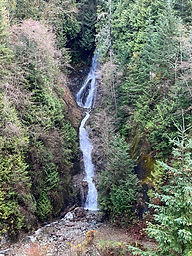Wildflowers In November
- kc dyer
- Nov 7, 2024
- 3 min read
Event includes a seed give-away and tips from a Master Gardener

If your mind needs a break from atmospheric rivers and election chaos, why not stop to smell the native wildflowers?
Master Gardener Jane Sherrott returns to the village this weekend to offer suggestions for native plants that can provide your garden with blooms regardless of the season.
Sponsored by Butterflyway Rangers Val Morton and Hana Boye, the event will include the opportunity to take home native potted plants and seeds to sow in your own garden.
But why would anyone be thinking of gardening in November?
For many gardeners the summer months are taken up with tending and watering existing plants, says Morton. "Ideas for changes and improvements to our gardens gradually take place during the summer; however, it is in the winter months that we often have time to really analyze which of these ideas are most important to us and how we might implement them."
Morton and Boye see the fall as an ideal time to plan to incorporate more native plants. "Perhaps you have a small lawn area that might be converted into a more ecologically beneficial garden," suggests Boye, adding that native plant seeds that have been collected during summer and fall can be germinated over the winter, ready for springtime planting.
"Many native plants need a period of wet and cold – called stratification – to trigger germination," says Morton. "This can be accomplished by placing the potted seeds outside for the winter, or simulating this process using refrigeration of the seeds prior to potting them up."
The duo also give consideration to fall garden clean-up. "The current thinking is that we should leave the spent plant stems in place rather than cutting them down and putting them out with the green waste," says Boye. "It's also important to leave the fallen leaves to decompose over the winter and provide nutrients to the soil and habitat for small organisms. Our impulse is to ’tidy up’ the garden and it takes some determination to allow it to remain messy looking over the winter to benefit the native populations."
Morton says that the question of whether native plants encourage bees and butterflies is a complex one that is the subject of much scientific investigation. "It is certain that many bees and butterflies are extremely specialized and feed on a very few specific plants. As well, butterfly larvae –caterpillars– often feed on only one specific plant."
She says that many specialist bees get their pollen and nectar from plants that have co-evolved with them, such as goldenrod, asters and sunflowers. "The generalist bees and butterflies can also get their nourishment from these same native plants, and it's beneficial to incorporate these plants into our gardens whenever possible."
Morton notes that while many a non-native plant appears to be buzzing with bees, often on closer examination these are often of limited species, and possibly even non-native bees. "To maintain a healthy ecosystem, we should be planting native plants that support many different types of insects," she says.
The Butterflyway Rangers will be giving away native plants that can go into the ground right now, since freezing hasn't set in and they are adapted to local winters.
Those interested in joining the Butterflyway Project can start with any patch of garden, or even just even a large pot. "The idea is that you commit to the goal of working with other villagers to increase the number of pollinator and host plants for caterpillars," says Morton. "With lots of small patches around the village, the bees, flies and butterflies have a multitude of food choices and this will gradually increase their populations over time."
If you'd like more information or to add your garden to the David Suzuki Foundation project, check out the Lions Bay Butterflyway Project Facebook page.
The gardening event runs from 10 a.m. to noon in Lions Bay Council Chambers at 400 Centre Road. In addition to the presentation by Jane Sharrott and seed sharing, a gardening book exchange will take place and refreshments will be served.
Have thoughts to share? The Watershed values your opinion!
Leave your comments below, or send an email to editor@lionsbaywatershed.ca
Like what you're reading? For as little as $5/month, you can support local independent journalism by subscribing to The Watershed HERE.


Comentários